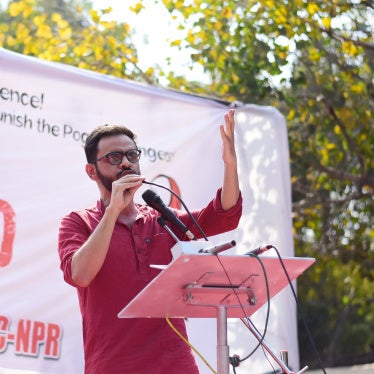On the difficulty distributing free condoms in Manila City, which bans the promotion of condoms in government health clinics:
It’s difficult because there are some areas where we can’t go. We don’t want stories of what we’re doing to spread, so we don’t go to areas where what we’re doing will spread. The mayor has banned family planning. We don’t want the barangay [local government] health volunteers to know what we’ve been doing. . . . Stories get passed on, and they might tell the story of what we’re doing at city hall meetings.
—Lilibeth Buenconsejo, community health outreach worker, Women’s Health Care Foundation, Quezon City, January 28, 2004
On the confiscation of condoms by police, who often use possession of condoms as evidence to prosecute prostitution:
If the police catch us, if they see the condoms, they’ll arrest us. They touch us all over the body and they find them. They ask, “What are you doing with condoms?” They get mad when they see us with condoms. They threaten us, like they say, “You want me to put this [the condom] in your mouth?”
—Maria S. (not her real name), a sex worker in Pasay City, January 30, 2004
On the growing shortage of free condoms in the Philippines, due to the recent cancellation of condom shipments by the United States and the government’s refusal to fill the gap:
I visited a rural health clinic in November 2003, and many of the barangay [local government] health workers were showing me empty containers of condoms. In some cases, health workers had taken the initiative of forming themselves into co-ops, buying from the source and selling them at 60 percent of the drug store cost. This was with their own money.
- —Senator Rodolfo Biazon, New York, February 5, 2004
From a pamphlet produced by the nongovernmental organization Pro-Life Philippines, which falsely claims that condoms do not provide protection against human immunodeficiency virus (HIV):
Do condoms prevent the spread of AIDS? NO. And there are other harmful things that condoms do: 1. Condoms tell people that promiscuity is all right. 2. Condoms offer false assurances from HIV infection. 3. Condoms trivialize sex and reduce it to a plaything.
- —Online: http://www.prolife.org.ph/article/articleprint/81/-1/34/ (retrieved March 4, 2004) (emphasis in original).
On misinformation about condoms and HIV/AIDS among Filipinos at risk of HIV infection, including sex workers, migrant workers, and young adults:
I don’t know anything about HIV or AIDS. I’ve heard the word from my customers and people I work with. Some people say that if you have sex with really handsome guys, that’s how it starts. . . . I use them [condoms] sometimes, let’s say out of ten times, maybe once. Most of my customers don’t like them, so to keep clean after sex, we’ll wash ourselves . . . . We wash the sperm from the men right away, because we think it’s very effective to use water to wash.
- —Leah P. (not her real name), a sex worker in Angeles City, January 23, 2004
Before I got AIDS, I used to say, “I’m a Catholic, I don’t use condoms” . . . . It’s what I learned in church—they are so stuck in procreation . . . . I was on vacation in Dubai, and I took a girl into a hotel, thinking it [AIDS] wouldn’t happen to me. When I got home, I went for voluntary testing and that’s how I found out.
- —Noel P. (not his real name), Manila, January 29, 2004
You can’t even begin to discuss reproductive health in any schools in Manila City . . . . The Department of Education claims they have reproductive health included in their curriculum, but when they discuss it in schools, it’s just on the surface. They discuss human anatomy, but not its implications for behavior, economics and risk. It’s a big issue. If we teach students how to use condoms, they think we are also provoking or encouraging them to have sex.
- —Dr. Marilyn A. Pajel-Calilung, AIDS educator and executive director, Kabalikat ng Pamilyang Pilipino, Manila, January 16, 2004
On the mistreatment of sex workers in government-run health clinics that provide testing for HIV and other sexually transmitted diseases (STDs):
They have me spread my legs, and they use cotton to get a sample. My friends and I never know if we’ve passed the tests or not. The nurses walk around and write down the results, but we never find out . . . . Once they told me I failed the test because I was having too much sex. All they said was that sex wasn’t good for me, because I was having too much of it. They didn’t tell me what disease I had.
- —Clara S. (not her real name), a sex worker in Angeles City, January 23, 2004








